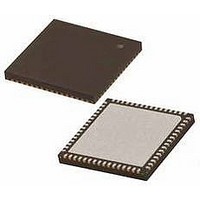PIC18F65K22-I/MRRSL Microchip Technology, PIC18F65K22-I/MRRSL Datasheet - Page 285

PIC18F65K22-I/MRRSL
Manufacturer Part Number
PIC18F65K22-I/MRRSL
Description
MCU PIC 32K FLASH MEM XLP 64QFN
Manufacturer
Microchip Technology
Series
PIC® XLP™ 18Fr
Datasheets
1.PIC16F722-ISS.pdf
(8 pages)
2.PIC18F65K22T-IPTRSL.pdf
(548 pages)
3.PIC18F65K22T-IPTRSL.pdf
(10 pages)
Specifications of PIC18F65K22-I/MRRSL
Core Size
8-Bit
Program Memory Size
32KB (16K x 16)
Core Processor
PIC
Speed
64MHz
Connectivity
I²C, LIN, SPI, UART/USART
Peripherals
Brown-out Detect/Reset, LVD, POR, PWM, WDT
Number Of I /o
53
Program Memory Type
FLASH
Eeprom Size
1K x 8
Ram Size
2K x 8
Voltage - Supply (vcc/vdd)
1.8 V ~ 5.5 V
Data Converters
A/D 16x12b
Oscillator Type
Internal
Operating Temperature
-40°C ~ 85°C
Package / Case
64-VFQFN, Exposed Pad
Controller Family/series
PIC18
No. Of I/o's
53
Eeprom Memory Size
1KB
Ram Memory Size
2KB
Cpu Speed
64MHz
No. Of Timers
8
Processor Series
PIC18F
Core
PIC
Data Bus Width
8 bit
Data Ram Size
2 KB
Interface Type
I2C, SPI
Maximum Clock Frequency
64 MHz
Number Of Programmable I/os
53
Number Of Timers
8
Operating Supply Voltage
1.8 V to 5.5 V
Maximum Operating Temperature
+ 125 C
Mounting Style
SMD/SMT
3rd Party Development Tools
52715-96, 52716-328, 52717-734, 52712-325, EWPIC18
Minimum Operating Temperature
- 40 C
On-chip Adc
12 bit, 16 Channel
Lead Free Status / RoHS Status
Lead free / RoHS Compliant
Lead Free Status / RoHS Status
Lead free / RoHS Compliant
- PIC16F722-ISS PDF datasheet
- PIC18F65K22T-IPTRSL PDF datasheet #2
- PIC18F65K22T-IPTRSL PDF datasheet #3
- Current page: 285 of 548
- Download datasheet (5Mb)
21.3.7
In Slave mode, the data is transmitted and received as
the external clock pulses appear on SCKx. When the
last bit is latched, the SSPxIF interrupt flag bit is set.
While in Slave mode, the external clock is supplied by
the external clock source on the SCKx pin. This
external clock must meet the minimum high and low
times as specified in the electrical specifications.
While in Sleep mode, the slave can transmit/receive
data. When a byte is received, the device can be
configured to wake-up from Sleep.
21.3.8
The SSx pin allows a Synchronous Slave mode. The
SPI must be in Slave mode with the SSx pin control
enabled (SSPxCON1<3:0> = 04h). When the SSx pin
is low, transmission and reception are enabled and the
SDOx pin is driven. When the SSx pin goes high, the
SDOx pin is no longer driven, even if in the middle of a
FIGURE 21-4:
2010 Microchip Technology Inc.
SSx
SCKx
(CKP = 0
CKE = 0)
SCKx
(CKP = 1
CKE = 0)
Write to
SSPxBUF
SDOx
SDIx
(SMP = 0)
Input
Sample
(SMP = 0)
SSPxIF
Interrupt
Flag
SSPxSR to
SSPxBUF
SLAVE MODE
SLAVE SELECT
SYNCHRONIZATION
SLAVE SYNCHRONIZATION WAVEFORM
bit 7
bit 7
bit 6
Preliminary
PIC18F87K22 FAMILY
transmitted byte and becomes a floating output.
External pull-up/pull-down resistors may be desirable
depending on the application.
When the SPI module resets, the bit counter is forced
to ‘0’. This can be done by either forcing the SSx pin to
a high level or clearing the SSPEN bit.
To emulate two-wire communication, the SDOx pin can
be connected to the SDIx pin. When the SPI needs to
operate as a receiver, the SDOx pin can be configured
as an input. This disables transmissions from the
SDOx. The SDIx can always be left as an input (SDIx
function) since it cannot create a bus conflict.
Note 1: When the SPI is in Slave mode with SSx pin
2: If the SPI is used in Slave mode with CKE
control enabled (SSPxCON1<3:0> = 0100),
the SPI module will reset if the SSx pin is set
to V
set, then the SSx pin control must be
enabled.
bit 7
bit 7
DD
.
Next Q4 Cycle
after Q2
DS39960B-page 285
bit 0
bit 0
Related parts for PIC18F65K22-I/MRRSL
Image
Part Number
Description
Manufacturer
Datasheet
Request
R

Part Number:
Description:
MCU PIC 32K FLASH MEM XLP 64TQFP
Manufacturer:
Microchip Technology
Datasheet:

Part Number:
Description:
32kB Flash, 2kB RAM, 1kB EE, NanoWatt XLP, GP 64 QFN 9x9x0.9mm TUBE
Manufacturer:
Microchip Technology
Datasheet:

Part Number:
Description:
32kB Flash, 2kB RAM, 1kB EE, NanoWatt XLP, GP 64 TQFP 10x10x1mm TRAY
Manufacturer:
Microchip Technology
Datasheet:

Part Number:
Description:
32kB Flash, 2kB RAM, 1kB EE, NanoWatt XLP, GP 64 QFN 9x9x0.9mm TUBE
Manufacturer:
Microchip Technology
Datasheet:

Part Number:
Description:
32kB Flash, 2kB RAM, 1kB EE, NanoWatt XLP, GP 64 TQFP 10x10x1mm TRAY
Manufacturer:
Microchip Technology

Part Number:
Description:
Manufacturer:
Microchip Technology Inc.
Datasheet:

Part Number:
Description:
Manufacturer:
Microchip Technology Inc.
Datasheet:

Part Number:
Description:
Manufacturer:
Microchip Technology Inc.
Datasheet:

Part Number:
Description:
Manufacturer:
Microchip Technology Inc.
Datasheet:

Part Number:
Description:
Manufacturer:
Microchip Technology Inc.
Datasheet:

Part Number:
Description:
Manufacturer:
Microchip Technology Inc.
Datasheet:










